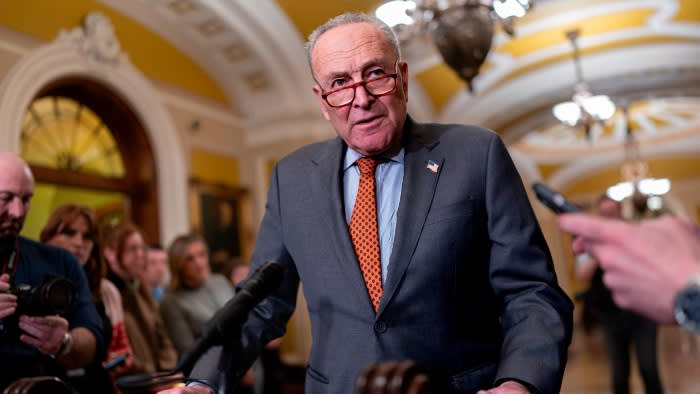Stay informed with free updates
Simply sign up to the War in Ukraine myFT Digest — delivered directly to your inbox.
US Senate negotiators have given up on passing a deal this year to provide billions of dollars in war funding for Ukraine, starting their holiday recess and pushing talks into January.
Negotiators from both parties in Congress have been wrangling for weeks over Republican demands to tighten US border security before considering a White House request for more funding for Kyiv.
But after talks floundered, Senate leaders on Tuesday confirmed that negotiations would have to proceed into January, after the holiday recess.
“The bottom line is that both Democrats and Republicans understand that there’s more work to do to pass legislation protecting America’s security and the security of the western world,” Chuck Schumer, the Democratic leader in the Senate, told reporters in Washington.
“Our goal is to get something done as soon as we get back” in January, Schumer added.
Volodymyr Zelenskyy, Ukraine’s president, visited Washington earlier this month in a bid to win more funding for Kyiv, but was rebuffed by Republicans in Congress.
President Joe Biden has warned that the US might “run out of money” to help Kyiv, adding that Congress’s refusal to increase aid would be a “gift” to Russia’s leader Vladimir Putin.
John Kirby, National Security Council spokesperson, said on Tuesday that existing funding authority would allow the Pentagon to send one more aid package to Kyiv this year, but that it would be the last without new legislation.
“We have one more security assistance package available to us before the end of this year before we run out,” he said. “That’s why it’s so critical that Congress act on that supplemental funding.”
The decision to push more talks into next month means negotiations could collide with congressional deadlines on January 19 and February 2 to avoid shutdowns of various government agencies.
The US has already sent more than $75bn in assistance to Ukraine, according to the Kiel Institute for the World Economy, a German research institute. The EU has given more financial aid to Ukraine, but the US has provided significantly more military aid.
Republicans have grown increasingly sceptical of giving more aid to Ukraine since Russia’s full-scale invasion almost two years ago. In December, Senate Republicans blocked a $111bn spending package that included $60bn for Ukraine.
Republicans have said they will resist further calls for Ukraine funding unless it is tied to funding for increased US border security. Apprehensions at the US-Mexico border have escalated from 1.7mn in the 2021 fiscal year to about 2.5mn this year.
“We cannot do a national security supplemental bill absent dealing with a national security crisis at our southern border,” said John Thune, the Republican Senate whip.
Debate in Congress has focused on how to detain, process and release migrants at US borders, including those seeking asylum.
Some Democrats, however, have baulked at efforts to give the federal government greater power to expel migrants, likening some proposals to Donald Trump-era policies.
“We all know there’s a problem at the border,” said Schumer on Tuesday. “We’re going to try to solve that problem consistent with our principles.”
Republican James Lankford and Democrat Chris Murphy, who are negotiators in the Senate, said this week that they were committed to striking a deal — after Christmas.
“I’m planning on staying at the negotiating table for however long it takes to get this done,” said Murphy.
